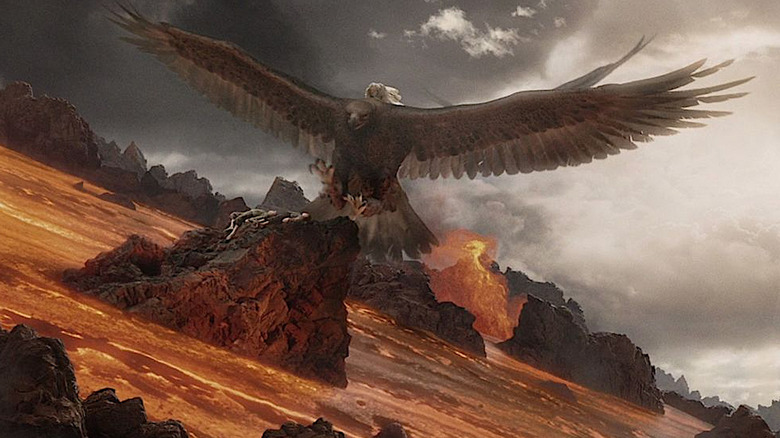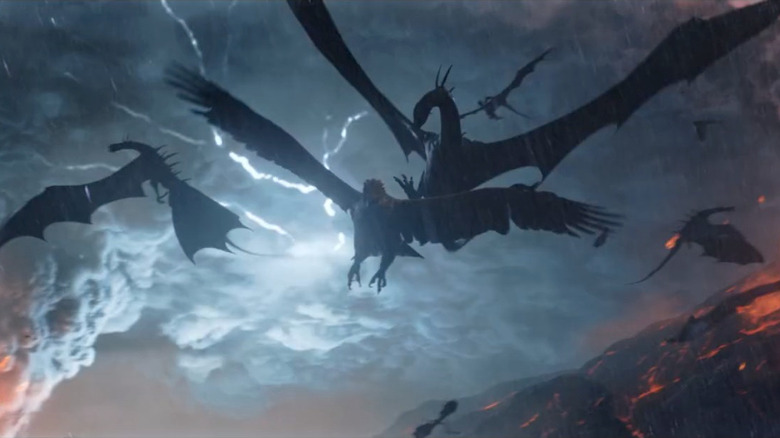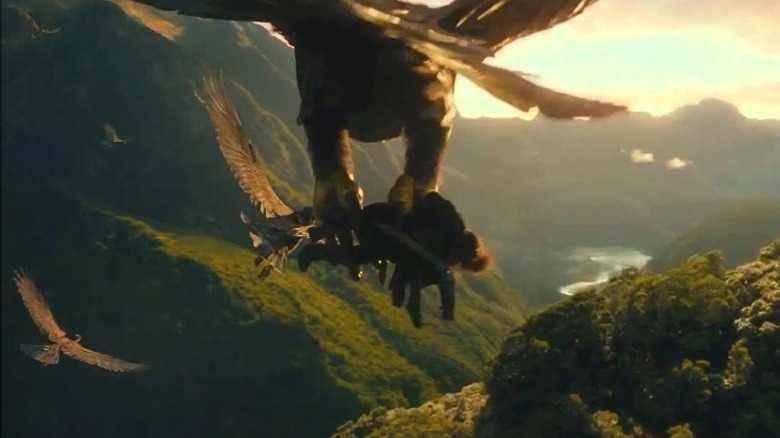Lord Of The Rings: What Would Happen If There Were No Eagles In Middle-Earth?
There are few Middle-earth "what ifs" as enduring as the "Why didn't the Eagles just fly the One Ring to Mordor?" theory. Casual Tolkien viewers see it as a gross oversight, while hardcore fans are all too ready to rabidly debunk the concept.
Tolkien himself had thoughts on the delicate role of the Great Eagles in his stories. In a letter in 1958, which critiqued the script for an early attempt to adapt his trilogy, he addressed the airborne beasts, saying, "The Eagles are a dangerous 'machine'. I have used them sparingly, and that is the absolute limit of their credibility or usefulness."
Okay. So far, so good. In the eyes of the author, the Eagles are important and must make rare appearances to avoid taking on the role of a rideshare service in the story. But here's another idea. What if the Eagles didn't exist in the first place? Despite Tolkien's claim of occasional use, the creatures tend to show up everywhere. What if they didn't? What if the only eagles in Middle-earth were mute, dumb, bald birds that were too small to carry more than a rabbit and only interested in scavenging for carrion?
It's a big question. The Great Eagles are more than an eject button reserved for when the Oxford professor wrote himself into a corner. They are his chief salvific tool. Tolkien calls the last-minute deliverance concept a eucatastrophe, which, in another letter, he defined as "the sudden happy turn in a story which pierces you with a joy that brings tears."
The many times Eagles get involved in Middle-earth history
The Eagles get involved in Tolkien's writings early on, showing up at the beginning of the First Age of Middle-earth (several thousand years before "The Lord of the Rings"). "The Silmarillion" explains that as the Elves began to fight the Dark Lord Morgoth, the powerful angelic guardian Manwë (who lives in the Undying Lands away in the East) "had sent forth the race of Eagles, commanding them to dwell in the crags of the North, and to keep watch upon Morgoth."
From here, the Lord of the Eagles, Thorondor, and his people repeatedly show up in the narrative. When the Elvish king Fingolfin is killed by Morgoth, Thorondor swoops in, wounds Morgoth's face, and recovers the body for a proper burial. When the Elven leader Maedhros is captured and chained to a mountain cliff, it's Thorondor who helps save him. When Beren and Lúthien need rescuing from Morgoth's fortress, it's the Great Eagles that give them a ride home. They help keep the hidden Elven fortress of Gondolin secret for centuries and ferry key people to and from that city, including one Huor — a key figure in both Elrond's backstory and Aragorn's ancestry.
At the end of the First Age, the Eagles fight in the earth-shattering War of Wrath, where Morgoth releases an army of Dragons (yes, an army of them), and the Eagles fight them in the skies. Thorondor, himself, defeats the greatest dragon of them all, Ancalagon, the Black. So, in the First Age alone, the Eagles repeatedly provide nick-of-time support for Tolkien's heroes. Without them, multiple Elvish heroes would have perished, major characters, including Elrond and Aragorn, would never have been born, and Morgoth may have never been defeated — and we're just getting started.
The Eagles remain important later in the story, too
The Eagles barely show up in the Second Age, and it isn't until the end of the Third Age that they start to take on their eucatastrophic responsibilities again. This starts in "The Hobbit" when they show up to save Gandalf, Bilbo, and company from the Goblins and then again to help turn the tide at the Battle of Five Armies. Before Bilbo spots the winged allies, the Hobbit is contemplating how the battle is about to end in disaster — and if it did, the consequences would have been horrifying.
In that case, the Elven army of Mirkwood would have been wiped out, along with both the Dwarves, who eventually resettle the Lonely Mountain, and the Men of Laketown. All three of these groups play pivotal off-screen roles in containing Sauron during "The Lord of the Rings." Even worse? Bilbo likely would have died, and the goblins may have even recaptured the One Ring. Game, set, match.
Half a century later, the Eagles get busy again during the events of "The Lord of the Rings." Their new king, Gwaihir the Windlord, saves Gandalf from his imprisonment at the top of Orthanc, which has some pretty obvious repercussions. Without Gwaihir's rescue mission, Gandalf wouldn't have joined the Fellowship of the Ring — nor would he have been there to guide that group through Moria, fight the Balrog, and generally conduct the resistance to Sauron across Middle-earth. And then there's the Black Gate. Without the Eagles, Aragorn, Gandalf, Legolas, Gimli, Pippin, Merry, and an army of men from Gondor and Rohan would likely have perished even as Frodo was fulfilling his quest. And the Ringbearer and his faithful servant, Sam? They would have died on Mount Doom, even in the moment of victory.
A counterpoint to the no-Eagle devastation
Pretty much everywhere the Eagles pop up in Tolkien's writings, they're saving the day. Without their presence, countless individuals, armies, and realms would have fallen into darkness. Villains would have remained at large, and the One Ring itself may have been recaptured by Sauron.
And yet, it's fair to think that none of that may have happened, even if the Eagles weren't involved in the story. Even if Middle-earth was Eagle-less, there's a good chance that all of those eucatastrophes would have still happened, even if they looked different. The concept of the eucatastrophe isn't dependent on Eagles. It has to do with the sudden and unexpected defeat of evil at the hands of good.
In his famous essay "On Fairy-Stories," Tolkien goes further into the concept of a eucatastrophe, explaining, "The consolation of fairy-stories, the joy of the happy ending: or more correctly of the good catastrophe, the sudden joyous 'turn' (for there is no true end to any fairy-tale): this joy, which is one of the things which fairy-stories can produce supremely well, is not essentially 'escapist', nor 'fugitive'. In its fairy-tale — or otherworld — setting, it is a sudden and miraculous grace: never to be counted on to recur."
In theory, then, if there were no Eagles, other factors would create that sudden, miraculous grace. Other powers that be would provide the joyous turn of fate, even if it didn't come via an Eagle's talon. Gandalf hints at this at the end of "The Hobbit" when he tells Bilbo, "You don't really suppose, do you, that all your adventures and escapes were managed by mere luck." Removing the Eagles from Middle-earth may feel bleak. But that eucatastrophic magic would have bubbled to the surface one way or another in the long run.



